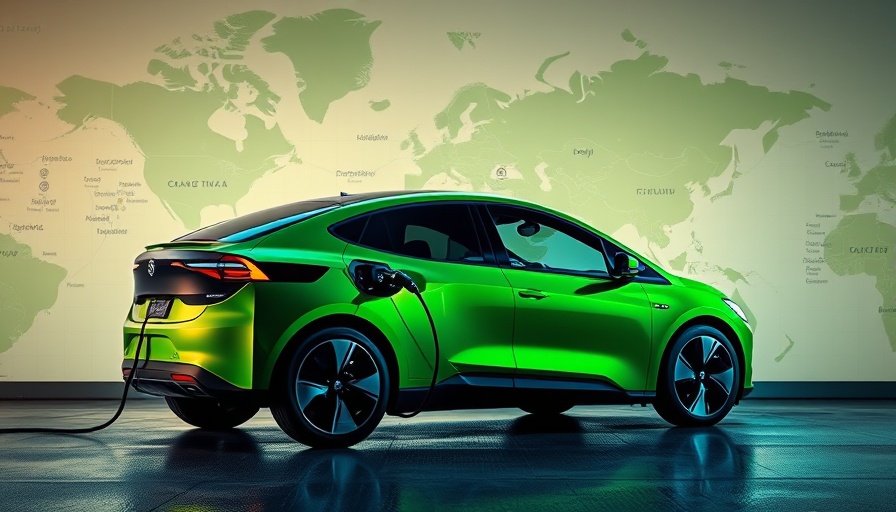
The Declining Federal EV Tax Credit: Hope Lies at the State Level
As the dust settles on the recent legislative changes regarding the federal electric vehicle (EV) tax credit, buyers across the United States face a challenging landscape. With Congress's decision to eliminate the federal $7,500 EV credit, many had expected a setback in the industry. However, states have stepped up, offering opportunities for consumers to still reap the benefits of purchasing an electric vehicle.
State-Level Incentives: A Financial Lifeline for EV Buyers
Innovative Initiatives: In a determined effort to encourage the adoption of clean energy and mitigate pollution, various states have expanded their incentives for electric vehicle purchases. According to a close examination of available data, there are now 13 states where buyers can acquire substantial rebates, ranging from cash back discounts to tax credits that alleviate the costs associated with electric vehicle ownership.
Colorado stands out with its Vehicle Exchange program recently announcing increases in their rebate amounts—new EV purchases can qualify for rebates between $6,000 and $9,000. Low-income buyers are also encouraged, as the state requires the trade-in of an eligible older vehicle, thus promoting a much-needed transition to cleaner alternatives. In stark contrast, California has struggled with desirable incentives since its previous rebates expired in 2023, showcasing the fluctuating nature of state support.
Exploring Opportunities in 13 States
The push for EV adoption has led to significant financial incentives across the country:
- Colorado: Up to $9,000 for new EVs and $6,000 for used models.
- Connecticut: Offers a $1,000 rebate for electric vehicles, with additional support for low-income households.
- Delaware: Provides rebates up to $2,500, contingent upon vehicle pricing.
- New Jersey: Allows for incentives up to $4,000, including bonuses for qualifying individuals.
These incentives can significantly impact an individual’s decision-making process when searching for an EV. Not only do they alleviate the initial investment burden, but they also present a chance for buyers to effectively manage their budgets as they transition to greener choices. Furthermore, advocates argue that these state programs are essential for reaching long-term climate goals while enabling significant economic benefits through technology adoption.
Impact on the EV Market Landscape
In an era where environmental concerns are at the forefront, the decision of many states to champion EV purchase incentives is not merely fiscal but deeply rooted in climate action. As noted in insights by Colorado Governor Jared Polis, the Electric Vehicle influx in his state exemplifies the potential benefits of strong state support: "Transportation is a leading source of emissions in Colorado, making widespread EV adoption essential to achieve our climate goals." Moreover, as EV manufacturers adapt their strategies to incorporate state-level incentives, we can expect a buoyant market even amidst federal reductions. For example, carmakers like General Motors and Ford continue to promote leasing models that take advantage of state incentives, creating dual benefits for customers.
Future Trends and Considerations
As states seek to maintain these incentives amid federal policy shifts, the future of electric vehicle incentives may become a battleground for political interests, particularly as the climate agenda pushes forward. Observers will need to keenly monitor legislative sessions in each state to predict how long these incentives will last and how they may evolve.
As consumers, understanding these dynamics can lead to smarter financial decisions and more energy-efficient purchases. Additionally, there’s potential for increased lobbying from manufacturers for broader tax incentives at the federal level, especially as EV demand continues to grow.
Bridging the Gap Between Policy and Impact
In conclusion, the current environment concerning electric vehicle incentives is an ever-changing tapestry influenced by both policy and economic pressures. With so much at stake, buyers should educate themselves about state programs that can alleviate the financial burden of transitioning to electric vehicles.
As you consider your options and the implications of these financial incentives, don't hesitate to engage with local representatives about future legislation that could solidify funding for these valuable programs. Remaining informed and proactive will be key to navigating the complex EV landscape successfully.
 Add Row
Add Row  Add
Add 




Write A Comment